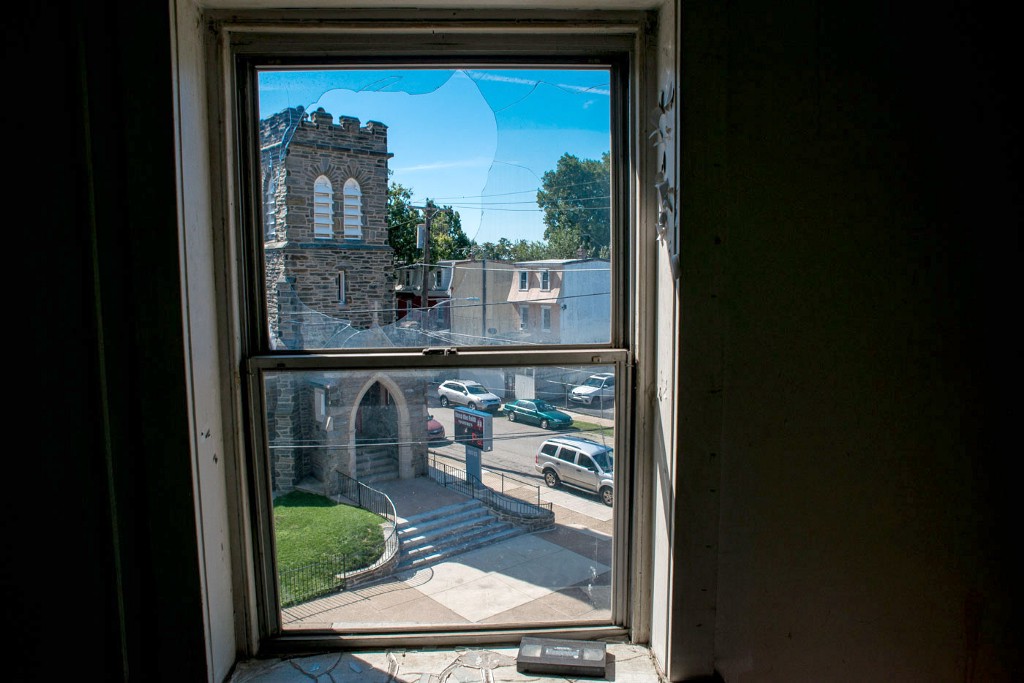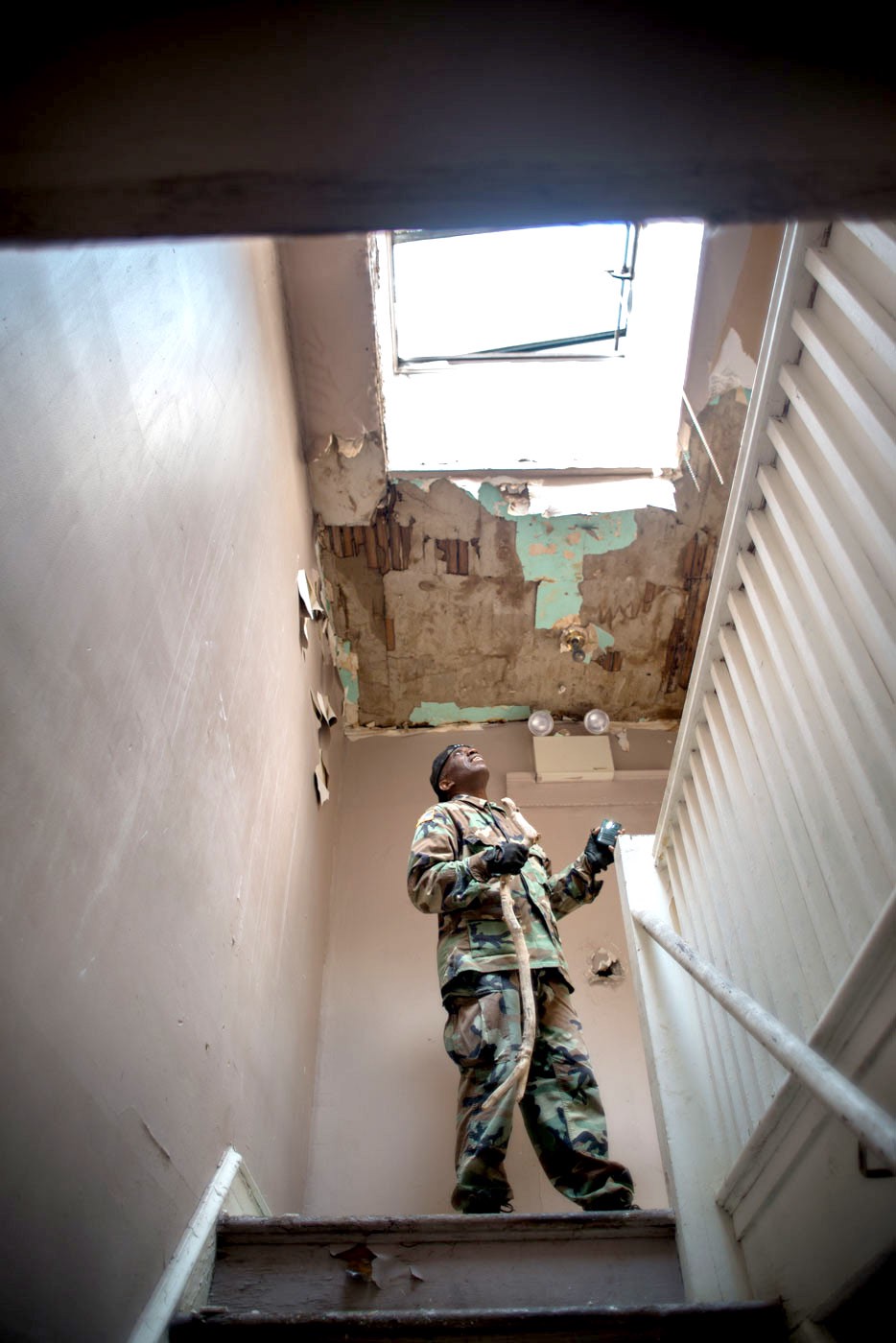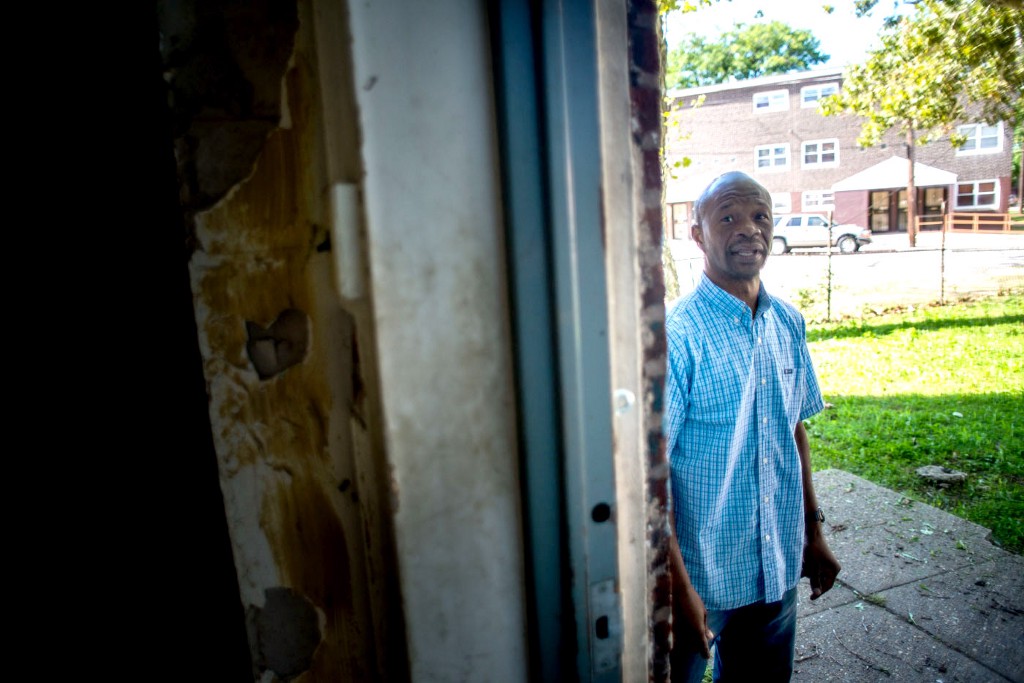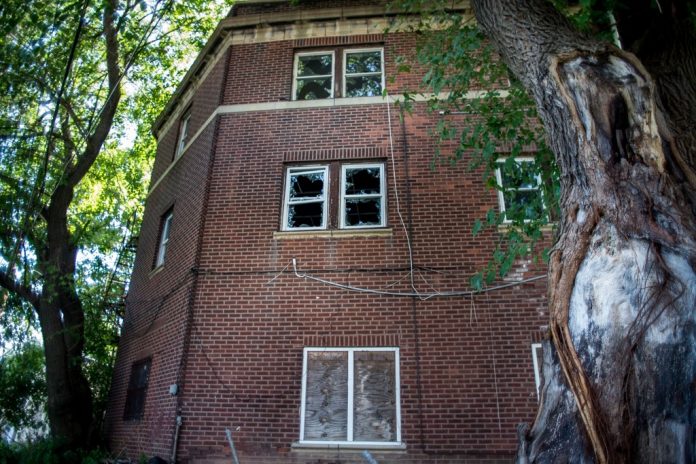In 2001, the city paid $800 for the building, which it now lists as being worth $125,600. MARIA POUCHNIKOVA / TIMES PHOTOS
The three-story, five-sided brick structure at Harrison and Cottage in Frankford might have been a grand building a long time ago. Not anymore. Yet, the congregation of the church across the street wants to bring it back, and its members are willing to spend big money and a lot of toil to do it.
How they might, or might not, get the chance depends on the congregation’s ability to convince the owner, the city of Philadelphia, that the immense job can be done and paid for.
The church has to show it can “insure and secure” the property, said City Councilwoman Maria Quinones Sanchez (D-7th dist.).
Right now, 4900–04 Cottage St. is a wreck. You might even say the place looks dangerous.
That is why insuring it so important.
“The minute we turn the property over to the church, liability is on the church,” the councilwoman said. Right now, liability is the city’s burden, she added.
The windows on the upper floors are all gone, with old venetian blinds hanging out of a few. The windows on the first floor are boarded up, and the doors are padlocked. The outside wall that faces Harrison Street is so cracked, you’d think there had been an earthquake in Frankford. You’re somebody who likes risk and is feeling lucky if you dare to climb the steps of the old metal fire escape in the building’s rear.
Inside, the plaster is falling down, and the dust mixed in with the smell of animal feces makes breathing difficult.
There is a triangle of green with stubborn old trees next to the building that the Keep the Faith Ministries congregants keep mowed, said Elder Henry Howard Jr., the pastor. Their fight against litter and short dumping, however, is a losing one, he said, pointing to trash piled up near the property’s rear on Valley Street.
Howard said his congregation wants the property if it can get it for cheap or for free. The idea, he said, is to turn it into a community center.
The first thing the church would do, Howard said, is fix up the ground floor to use for its soup kitchen. Right now, the congregation provides food to the hungry twice a week from the church basement. The first floor would also have a computer room and activities room for the congregation. When that is done, the congregation will start reclaiming the top two floors.
The work won’t be cheap or easy, he said Aug. 13 as he looked over the building. The roof is shot, and vandals long ago trashed the interior. The pipes are gone, he said, and so is the boiler.
People still get inside.
“I don’t know how they get in,” he said, pointing to the padlocked doors and boarded first-floor windows. But they do, he said, adding sometimes, he had seen lights on inside a building he thought had no utility connections. PECO workers checked on that two weeks ago and found an illegal connection to power lines, which they dismantled.
Howard estimates it would cost $100,000 to repair the building, take down some of the trees before they fall down and fence the property’s small patch of green to curb the litter and the dumping.
His congregation is willing to spend that and, Howard said, it has members who know how to do the work. But right now they are not going to do any more than cut grass and haul away trash because they don’t own the property.
Howard said the city wants $71,000 for it, which he said is not affordable given the money repairs would cost. He said the congregation has offered $10,000 for the building, which the city picked up in a sheriff’s sale, according to Jamila Davis, a spokeswoman for the Office of Housing and Community Development.
According to the Office of Property Assessment’s online records, in November 2001, the city paid $800 for the building, which it now lists as being worth $125,600. Davis said the building was listed as a vacant commercial property. However, OPA records show it as a residential structure.
Earlier this month, Elder Howard said he’d gladly give the city its $800.
In an Aug. 18 email to the Northeast Times, Davis wrote that the church has been in negotiations with the city. If the church wants to acquire the property, it must show through bank statements or account information that it has the $10,000 it offered.
But, that’s not all.
The church also has to show a development and financial plan, “including a list of the licensed contractors that would do the work at nominal cost or for free,” according to Davis.
She wrote that the pastor has stated he has the resources to complete the rehab work, but “those resources have to be demonstrated.”
The church also has to provide proof of the means to buy materials and obtain the licenses and inspections to do the job.
A City Council committee already has denied the church’s request to obtain the property, according to Councilwoman Sanchez. The church has the good intentions, she said, but its members have not satisfied Council’s Vacant Property Review Committee that it can do the work.
When the church can show it has the capacity to take care of the building, it could get that committee approval, she said.
“The city wants a ‘one-pager,’” the councilwoman said. “What is your plan and how do you have the financial means to execute your plan.”
If the church gets the approval, the councilwoman said, “I have to present a [City Council] resolution for the city to sell it.”
If all of that sounds a little more complicated than it has to be, the councilwoman would agree. So would Elder Howard. In early August, he told members of the Frankford Civic Association that he thought the church had made progress in getting the property, but that changed a year or so ago.
The trouble is, people get different answers from different government departments, and the impression people get is that no one’s in charge, Sanchez said. That’s something the councilwoman hopes will change as the city’s land bank legislation is implemented.
The land bank idea is the notion that vacant property should not only be developed more easily, but it shouldn’t take a doctorate to follow the procedures to acquire it either.
For his part, Howard said he believes his church’s insurance policy would cover the Cottage Street building once it is acquired. He also said he had thought that he had given the city all the information it requires. Still, he said Friday night, he and his members will do everything again if they have do. The church, he said, will do whatever it takes. ••

The church is seen through a broken window.

A church member observes falling plaster.

Falling down: At left, Elder Henry Howard Jr., the pastor of Keep the Faith Ministries, stands by a vacant building at Harrison and Cottage in Frankford. The congregation wants to purchase the property with plans to turn it into a community center. MARIA POUCHNIKOVA / TIMES PHOTOS













